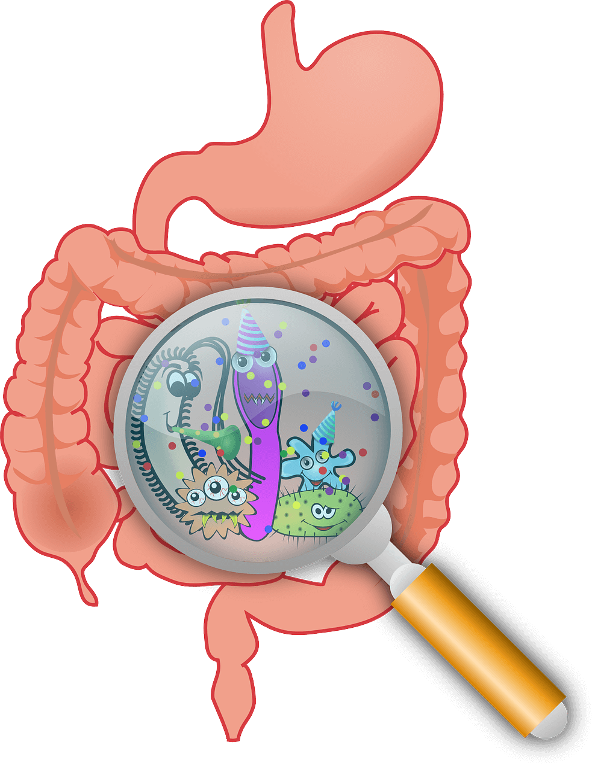How Do Our Bodies Maintain Healthy Gut Flora?
Normally, your intestines contain their own mini-ecological system containing a wide and diverse balance of bacteria. There are typically over 400 species of bacteria in the intestinal microflora. These bacteria are necessary for the proper digestion of your food, they help control pathogens, and they even play a role in the synthesis of vitamins. Any imbalance in this ecological system (whether quantitative or qualitative) can result in significant health consequences including SIBO (Small Intestinal Bacterial Overgrowth). When the “good” bacteria become overwhelmed with “bad” bacteria, you can suffer from symptoms such as bloating, cramping, diarrhea, malabsorption, malnutrition, and weight loss. This imbalance, called “dysbiosis” can be miserable!
Included in this family of bacteria that normally reside in the gut are some fungi. Some fungus, such as candida, are a normal part of gut flora. But when dysbiosis occurs, these fungi can also overgrow in the intestines and lead to a similar condition called SIFO – Small Intestinal Fungal Overgrowth.
Your body has numerous mechanisms in place to maintain normal gut flora. Any breakdown in these mechanisms can result in dysbiosis. What are these mechanisms to protect you from nasty conditions associated with dysbiosis?
Stomach Acid Must Be Maintained to Prevent SIBO/SIFO
First, stomach acid helps! When food enters the stomach, your vagus nerve signals the stomach to release stomach acid (gastric acid) to help break down your food, and to pump out intrinsic factor to help absorb some B vitamins. Gastric acid plays a key role in the digestion of proteins by beginning the process of unraveling the protein into amino acids. This gastric acid also plays an important role in killing the bacteria that can result in food poisoning or dysbiosis. The acidity level (pH) of gastric acid in humans is approximately 1.5 to 3.5 (this is highly acidic) and must be maintained to help prevent SIBO/SIFO. If your stomach acid production is low, dysbiosis can occur. Some medications reduce stomach acid (proton pump inhibitors, acid reducers such as Zantac or Tums) as can any problem with the vagus nerve. Your vagus nerve allows normal, healthy levels of stomach acid to help maintain normal gut flora and to prevent dysbiosis such as SIBO/SIFO.

The Vagus Nerve Controls The Digestion Process
Next, after your stomach has successfully broken down your food and killed some of the bad bacteria, your vagus nerve signals the valve at the base of your stomach (the pyloric valve) to open and release its contents into your small intestine. When your vagus nerve is not working properly for any reason, food can sit in your stomach for hours! You may get full very quickly and experience bloating, poor appetite, and eventually — weight loss and malnutrition. The vagus nerve’s signal to the pyloric valve is an important function to help prevent SIBO/SIFO.
After exiting your stomach, your food (now called chyme) enters your small intestine — thanks to your vagus nerve which allows this movement (or motility) throughout your digestive tract. Your vagus nerve now signals your gallbladder to release bile to help digest fats. Should the vagus nerve not be working properly, the gallbladder may never get the signal to release bile. The best-case scenario means that the gallbladder sits there quietly, doing nothing. Ultimately, this can lead to poor digestion, malabsorption, and dysbiosis. The worst-case scenario involves sludge collecting in the gallbladder, and eventually gallstones (in addition to poor digestion, malabsorption, and dysbiosis). Gallbladder bile also has antibacterial properties! Good gallbladder function is important to help you digest your food and prevent SIBO/SIFO.
As the chyme moves through the intestines, the pancreas is then signaled to release digestive enzymes to further digest proteins and fats. The pancreas is partially under control of the vagus nerve, and is another important organ in normal digestion and in the prevention of dysbiosis.
When gallbladder bile and pancreatic digestive enzymes are released by the gallbladder and pancreas, they are ultimately pumped into the digestive tract via the Sphincter of Oddi. This sphincter is also under the control of the vagus nerve!
The vagus nerve is responsible for the movement of food, chyme, and ultimately stool throughout the digestive tract. When this movement is sluggish due to poor vagus nerve function, abnormal fermentation of the poorly digested food takes place, and “bad” bacteria can begin to overwhelm the “good” bacteria. One mechanism the body has to prevent this state is normal and continuous peristalsis (waves that push the food along) and regular bowel movements. This is under control of the vagus nerve.
So, stomach acid production, the opening of the pyloric valve, gallbladder bile release, pancreatic digestive enzymes release, the opening of the Sphincter of Oddi, and peristalsis (or movement) throughout the digestive tract are all under control of the vagus nerve! If your vagus nerve is not performing optimally, you are much more susceptible to SIBO or any form of dysbiosis.
How Do You Support Your Vagus Nerve?
Parasym Plus™ is the only supplement mix patented to gently nudge the vagus nerve to support all of these functions! By supplying everything your body needs — in just the right quantities — to stimulate the (postganglionic) vagus nerve or the receptor itself, these functions can normalize. Bowel movements become regular, the organs work properly, and you can avoid problems with dysbiosis.
Two other products can also help by supporting these functions of the vagus nerve. Vagus Nerve Support™ Soothing Digestive Aid will boost stomach acid levels necessary while eating. This product contains a fairly high concentration of apple cider vinegar to promote proper acidity of the stomach. Anyone who is taking acid-reducers or baking soda can benefit from this additional boost of acidity. For those people who have just recently introduced Parasym Plus™, this boost of acid can also help while the gastrointestinal tract is beginning to normalize. It also contains ginger to both promote motility and soothe a sensitive digestive tract.
Another powerful addition to help is Vagus Nerve Support™ Digestive Enzymes. Unlike other enzymes, these are specially formulated for those needing vagus nerve support (who tend to be sensitive). Lower levels of protease are important because protease can irritate the stomach lining. Omitting inulin (a probiotic that is also a FODMAP) is helpful to avoid the bloating and discomfort that can occur with the ingestion of a FODMAP. And Vagus Nerve Support™ Digestive Enzymes purposefully omits cellulase. Cellulase is not normally produced by humans because it breaks down fiber — which is necessary to keep stool soft and promote normal bowel movements. This special blend of digestive enzymes is gentle, but effective, and is a great addition for those who don’t have a gallbladder or who are just getting started with Parasym Plus™.
Together, this trio is a powerful combination to assist in all aspects of normal digestion which promotes the proper intestinal microflora necessary to avoid dysbiosis.
Dr. Diana Driscoll has received three patents to date concerning new science in vagus nerve function.
If you want to be your best, support your vagus nerve.

Diana Driscoll, OD
Founder, Clinical Director at POTS Care
Dr. Diana Driscoll, an Optometrist, is the President of Genetic Disease Investigators, LLC – a research corporation devoted to helping people affected by “invisible illnesses”. Read more…
References:
Bures, Jan, et al. “Small Intestinal Bacterial Overgrowth Syndrome.” World Journal of Gastroenterology, Baishideng, 28 June 2010. [PubMed]
Dukowicz, Andrew C, et al. “Small Intestinal Bacterial Overgrowth: a Comprehensive Review.” Gastroenterology & Hepatology, Millennium Medical Publishing, Feb. 2007. [PubMed]
Erdogan, Askin, and Satish S C Rao. “Small Intestinal Fungal Overgrowth.” Current Gastroenterology Reports, U.S. National Library of Medicine, Apr. 2015. [Full Article]
Ghoshal, Uday C, et al. “Small Intestinal Bacterial Overgrowth and Irritable Bowel Syndrome: A Bridge between Functional Organic Dichotomy.” Gut and Liver, Editorial Office of Gut and Liver, 15 Mar. 2017. [PubMed]
Jacobs, C, et al. “Dysmotility and Proton Pump Inhibitor Use Are Independent Risk Factors for Small Intestinal Bacterial and/or Fungal Overgrowth.” Alimentary Pharmacology & Therapeutics, U.S. National Library of Medicine, June 2013. [Full Article]
Quigley, Eamonn M M. “The Spectrum of Small Intestinal Bacterial Overgrowth (SIBO).” Current Gastroenterology Reports, U.S. National Library of Medicine, 15 Jan. 2019. [PubMed]
Sachdev, Amit H, and Mark Pimentel. “Gastrointestinal Bacterial Overgrowth: Pathogenesis and Clinical Significance.” Therapeutic Advances in Chronic Disease, SAGE Publications, Sept. 2013. [Full Article]

0 Comments